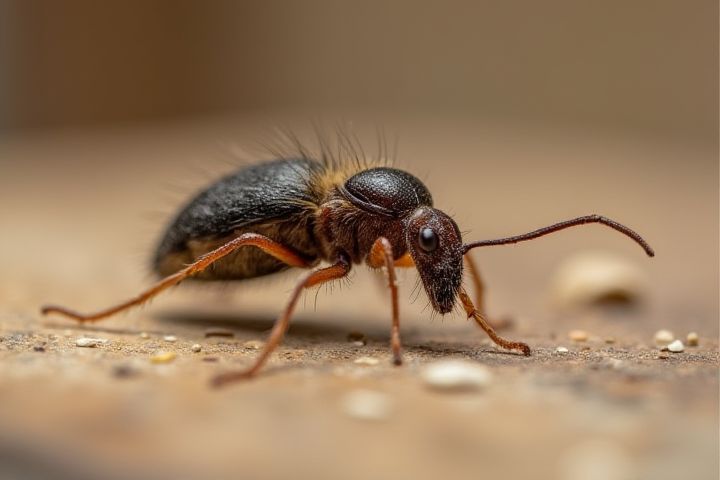
To effectively eliminate house pests, start by identifying the specific type of pest invading your home, such as rodents, ants, or cockroaches. Implement preventive measures, such as sealing cracks and crevices where pests may enter, and ensuring that food is stored in airtight containers. Utilize natural remedies like diatomaceous earth or vinegar solutions, which can deter insects without harmful chemicals. You can also set traps or use baits targeted towards specific pests for a more direct approach. If the infestation persists, consider contacting a professional pest control service to address the issue thoroughly and safely.
How To Get Rid Of House Pests
Identify the pest accurately
Accurate identification of the pest is crucial in effectively eliminating unwanted house guests. Start by observing the characteristics of the pest, including its size, color, and behavior, as these details can reveal whether you are dealing with ants, cockroaches, bed bugs, or rodents. Utilize resources like online guides, pest identification apps, or consult with pest control professionals to ensure you pinpoint the species precisely. Once correctly identified, you can implement targeted strategies, such as using specific traps or baits, to efficiently control the infestation.
Keep food sealed and stored properly
To effectively eliminate house pests, ensure all food items are sealed in airtight containers and stored in cool, dry places. This simple yet powerful strategy reduces access to potential food sources for insects and rodents, significantly lowering the risk of infestations. Regularly clean pantries, countertops, and other food storage spaces to minimize crumbs and spills that attract pests. Implementing these practices can lead to a noticeable decline in unwanted guests in your home.
Maintain a clean and clutter-free home
To effectively eliminate house pests, maintaining a clean and clutter-free environment is crucial. Regularly vacuum carpets and rugs, ensuring to pay attention to corners and under furniture, as this can help remove food particles and pest eggs. Store food in airtight containers and promptly clean up spills and crumbs, which can attract unwanted insects. Organize and declutter areas to minimize hiding spots, making it less inviting for pests to inhabit your home.
Seal cracks and entry points
Sealing cracks and entry points is a crucial step in pest control, preventing insects and rodents from entering your home. Inspect areas like windows, doors, foundations, and utility lines, looking for gaps or holes larger than 1/8 inch, as these can be entryways for pests. Use caulk or expanding foam for smaller openings, while larger gaps may require weatherstripping or mesh screens. By eliminating these vulnerabilities, you can significantly decrease the likelihood of infestations and protect your living space from a variety of pests.
Use natural repellents like essential oils
Natural repellents such as essential oils can effectively deter house pests without harmful chemicals. For instance, peppermint oil can repel spiders and ants, while tea tree oil is known to deter cockroaches and mold. A typical ratio for use is mixing 10-15 drops of essential oil with water in a spray bottle; this solution can be applied to entry points and infested areas. Regular application, approximately every few days, enhances its efficacy, ensuring your home remains pest-free and safe for you and your family.
Set traps or baits for specific pests
Set traps or baits specifically designed for the type of pest you are dealing with to effectively reduce their population. For instance, snap traps are ideal for mice, while sticky traps can catch crawling insects such as roaches and ants. Use bait stations for baiting rodents, ensuring they contain food substances that appeal to these pests but are also safely secured from pets and children. Regularly monitoring and replacing these traps will enhance your pest control efforts, making your home less inviting to unwanted visitors.
Regularly dispose of garbage
Regularly disposing of garbage is crucial in pest management, as accumulated waste can attract various pests such as ants, roaches, and rodents. Ensure that you securely seal all trash bags and store them in airtight containers to minimize odors and access. Aim to take out your garbage at least once a week, or more frequently if necessary, especially during warm months when pest activity increases. By maintaining a clean environment and reducing food sources, you significantly decrease the likelihood of an infestation in your home.
Maintain proper humidity levels
Maintaining proper humidity levels in your home is crucial for pest control, as many pests thrive in humid environments. Aim for indoor humidity levels between 30% and 50%, which can deter common invaders like mold mites, cockroaches, and dust mites. You can use dehumidifiers to regulate moisture, especially in areas prone to dampness such as basements and bathrooms. Regularly monitoring humidity levels with a hygrometer can help you take timely action and keep your home pest-free.
Regularly inspect and clean dark areas
Regularly inspecting and cleaning dark areas in your home is essential for effective pest control. Focus on spaces such as basements, attics, and behind appliances, where pests like rodents and insects often hide. Ensure these zones are free from clutter, food particles, and moisture, as these attract unwanted creatures. Implementing this maintenance routine not only enhances your home's cleanliness but also significantly reduces the likelihood of infestations.
Hire professional pest control services if necessary
Hiring professional pest control services is crucial when dealing with stubborn infestations, as specialized technicians possess advanced knowledge and tools. Many pest control companies offer targeted treatments for a variety of pests, including termites, rodents, and bed bugs, ensuring effective elimination. It's essential to review customer testimonials and check for certifications; some services even provide warranties for their work, giving you peace of mind. With an average cost of $150 to $500 depending on the severity and type of infestation, investing in professional help can save you from potential property damage caused by pests.
